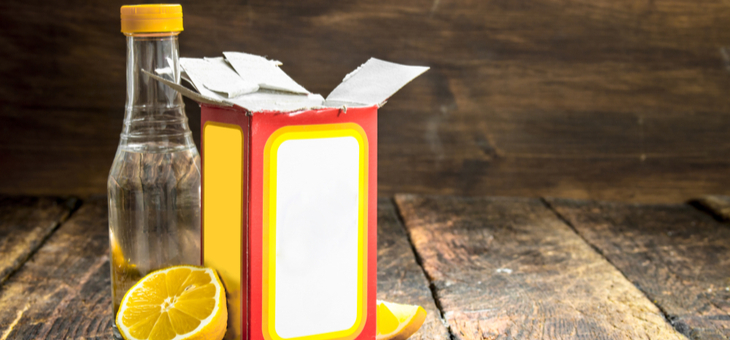Do you really need to reach for the chemical-laden household cleaner, when lemons, vinegar and bicarbonate of soda could do some of the jobs just as well?
TV’s ‘Queen of Clean’ Lynsey Crombie says: “I go for white wine vinegar because it makes a stronger cleaning product. It’s great for combatting mould in the bathroom, limescale on the taps or showerhead and for doing glass and windows.
“It’s also great as an odour-buster. It might smell of vinegar for a while, but that smell will disperse and break down other odours.
“Lemons are great for making a multipurpose cleaner, they’re great for limescale and for shining. You get a good shine from a lemon and they leave your home smelling gorgeous.”
Her new book, The Easy Life, offers a wealth of tips on quick ways to clean your home. Here she suggests how simple things you probably have around the house can help.
Which vinegar to use?
There are dozens of different types of vinegar, most of them are made using a double fermentation process. The only exception is white vinegar, which is usually made of lab-produced acetic acid and water; this makes it a lot more acidic than other types of vinegar. The acidic property is what makes it such a potent cleaner. White vinegar can be too strong for some types of cleaning, so you may need to dilute it with water – or go with something milder such as apple cider vinegar.
Due to its acidity, white vinegar can bust through some sticky build-ups with ease. It can dissolve soap scum, brines left by hard water, and that glue residue left behind when you remove a sticker. It’s also great on glass and mirrors, no-wax floors and gives an extra-clean shine to wood panelling and kitchen cabinets.
Many day-to-day stains we acquire, such as sweat marks or grass stains, are slightly acidic and will fade or disappear when another acid, such as vinegar, is added. But be wary of using a strong vinegar mixture on delicate fabrics as this can stain it further.
There are other surfaces around the home where vinegar may do more harm than good – for example, it can scratch natural stone such as granite or marble.
And remember, it may be great for tackling mould and mildew but it is not an approved disinfectant as there’s no evidence it can defeat some of the most harmful pathogens that lurk in the home, such as salmonella.
Here are Lynsey Crombie’s 10 tips for using natural cleaners:
1. Hide fridge smells
Put a small dish of bicarbonate of soda in the back of your fridge, which will soak up food smells and is particularly good if you’ve had an Indian dish or fish.
2. Keep your dishwasher fresh
Wipe down seals around the dishwasher door with a solution of 50 per cent white wine vinegar, 20 per cent neat lemon juice and 30 per cent water. Put the solution in a spray bottle so you can use it for other cleaning jobs. After rinsing your dishwasher filter, run a rinse cycle using lemon juice.
3. Spritz your microwave
Place four slices of lemon into a microwave-safe bowl of water and cook on high for three minutes. The steam from the water should loosen stuck-on bits of food and grease, then all you have to do is wipe it clean with a damp cloth. And it should leave your microwave smelling fresh.
4. Blitz bathroom grime
Mould and mildew spread faster in humid conditions, especially in the bathroom. Spray patches of mould with neat white wine vinegar, leave for 30 minutes then rinse. The mould should disappear without the need for scrubbing.
5. Wash your washing machine
To keep it fresh, run a quick cycle with white wine vinegar weekly, which should neutralise smells and keep mould build-up at bay.
Bicarbonate of soda is great to use with your laundry. Pop a spoonful of bicarb soda into liquid detergent when doing a white load, spin it around a bit and it will bring your whites up beautifully.
6. Create a glass and window cleaner
Use 20ml white wine vinegar, 10ml lemon juice and fill the rest of a 500ml spray bottle with water. Shake and it’s ready to use. It will clean mirrors, mirrored furniture, windows and even metal taps.
7. Unclog kitchen drains
Sprinkle bicarbonate of soda into the drain, then pour down some white wine vinegar. Cover the plughole with a wet cloth while the two react with one another to clean the drain. Wait five minutes and run hot water to clear it.
8. Perk up wooden chopping boards
If they are looking a little tired, you can perk them up using half a lemon and some salt.
9. Care for your cupboards
Cleaning the inside of your kitchen cupboards may be something you dread, but after you’ve taken everything out, a diluted vinegar solution should make light work of disinfecting sticky surfaces.
10. Clean burnt pots and pans
If food gets burnt onto the bottom of your pot or pan, fix it quickly without having to scrub it forever. Simply add one cup of warm water and one cup of vinegar into the pot or pan. Then add two to four tablespoons of baking soda and let it all soak for a few minutes. Pour out the mixture into the sink, use a sponge to wipe away any residue left and then rinse and wash as usual.
Do you use natural cleaning products around the home?
– With PA
If you enjoy our content, don’t keep it to yourself. Share our free eNews with your friends and encourage them to sign up.
Related articles:
How to clean a drain
Are your cleaning products toxic?
Coronavirus myths tackled

